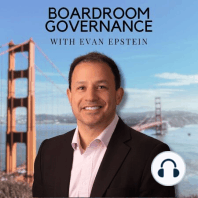61 min listen

Heidi Roizen: On Startup Governance and The Startup Solution.
Heidi Roizen: On Startup Governance and The Startup Solution.
ratings:
Length:
61 minutes
Released:
Sep 5, 2023
Format:
Podcast episode
Description
0:00 -- Intro.1:35 -- Start of interview. *Link to our first episode: E6 from June 2020.2:18 -- On the origin story of her new podcast: The Startup Solution with Heidi Roizen. 4:23 -- The Case of the Boardroom Blow-Up. How entrepreneurs should go from 'pitching' to 'partnering' with their investors. "Entrepreneurs get stuck in pitch mode." On terms "happy ears" and "jazz handy." On the golden rule of the boardroom: no surprises. "A board meeting should be a working meeting, it should not be a performance." On "Boardzillas."15:55 -- What should entrepreneurs know about how VC funds works? On VCs wearing two hats in the boardroom (as a board member and as an investor). On the Trados case and the Rule of Common Maximization.19:42 -- The Case of the Downer Round. On the preference stack and nuances of venture financing. On "structured terms" or "dirty terms." "When an entrepreneur trades structure for valuation, they are almost always giving downside protection in order to get more of the upside." [Heidi's more detailed blog post on down-rounds. Take by Janelle Teng]. On the pendulum of influence from founder-friendly to investor-friendly.33:00 -- On secondary transactions of private company shares. On reasonable and/or rational options. On removing founders. "Inside a market there is always is a sub-market, and right now generative AI is very hot."41:51 -- The Case of the In-Law Investors. What to consider when doing an angel investment. "When anyone asks me whether they should make a seed investment, I tell them to do so only if 1) they can do so with money they can afford to lose; 2) they don’t mind tying up those funds for seven years or more (it's an illiquid investment); and 3) they have enough additional money to put about 30-40% more in a future round if the opportunity or need arises. More importantly: founders should consider how they would feel if 'family & friends' lost the money as a result of their startup failing. 45:26-- The Case of the Strategic Sucker-Punch. The difference between a strategic investor (corporate venture capital investor) vs a pure venture investor: the latter only makes money by buying the stock low and selling the stock high while the former also makes money if its stock also goes up. "They are called strategic investors for a reason: they are using investment dollars to drive strategy that should be additive to their strategy."49:07 -- On best practices with board observers. ROFRs.51:07 -- On the role of independent directors in startups. Promoting diversity in startup boards. Fred Wilson (USV)'s board diversity proposal.57:44 -- On cross-over and PE board governance and cultural distinctions with VC.Heidi Roizen is a venture capitalist, corporate director and ‘recovering’ entrepreneur. She’s a partner at Threshold Ventures__ You can follow Heidi on social media at:Twitter: @HeidiRoizenLinkedIn: https://www.linkedin.com/in/heidiroizen/ The Startup Solution: https://threshold.vc/podcastThreshold VC: https://threshold.vc/__ You can follow Evan on social media at:Twitter: @evanepsteinLinkedIn: https://www.linkedin.com/in/epsteinevan/ Substack: https://evanepstein.substack.com/__You can join as a Patron of the Boardroom Governance Podcast at:Patreon: patreon.com/BoardroomGovernancePod__Music/Soundtrack (found via Free Music Archive): Seeing The Future by Dexter Britain is licensed under a Attribution-Noncommercial-Share Alike 3.0 United States License
Released:
Sep 5, 2023
Format:
Podcast episode
Titles in the series (100)
Scott Kupor: "We Have Institutionalized The Network To Support Our Portfolio CEOs": In this episode, I talk with Scott Kupor, the Managing Partner at Andreessen Horowitz, a leading Silicon Valley-based venture capital firm with over $12 billion in assets under management. Scott is an expert in corporate governance for venture-backed companies, so in this episode we go deep into foundational and hot topic governance questions involving startups and venture capital. We also talk about frontier questions such as the impact of crypto for the future of startups and venture capital. Don't miss this primer on governance for venture-backed companies! by Boardroom Governance with Evan Epstein